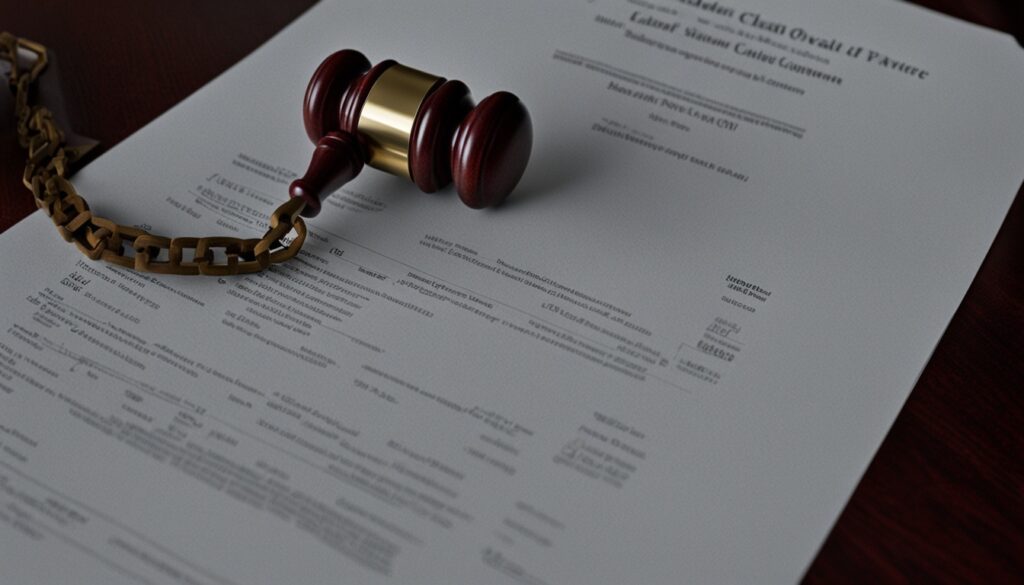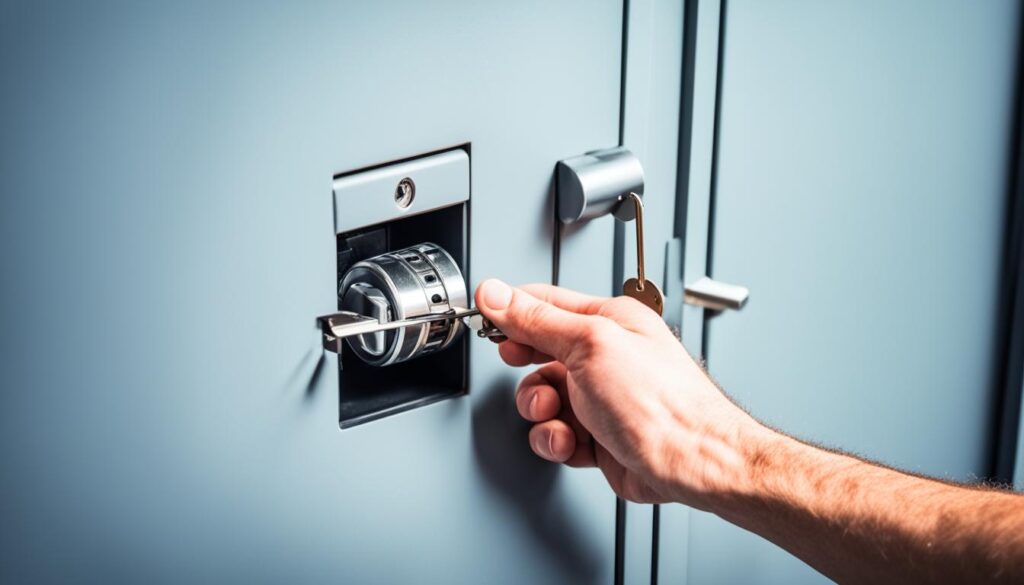Facing power of attorney (POA) abuse might seem hard, but the key is knowing how to show it. This is crucial for keeping those at risk safe. If you think someone you love is being taken advantage of, you need to find proof. Taking legal steps can help stop the abuse and bring justice.
Key Takeaways
- Recognizing the signs of power of attorney abuse, such as unusual account activity, missing documents, and isolation from family.
- Gathering financial records and legal documents to identify suspicious transactions or changes in the principal’s estate.
- Consulting with an experienced power of attorney lawyer to build an ironclad case and explore legal remedies.
- Pursuing civil or criminal charges against the abusive agent to recover assets and hold them accountable.
- Implementing preventive measures like naming co-agents and seeking professional fiduciaries to avert future abuse.
Understanding Power of Attorney Abuse
What is Power of Attorney?
A power of attorney (POA) is a legal document. It lets an individual make decisions for someone else. This person is called the “agent” or “attorney-in-fact”. The one they make choices for is the “principal”. These decisions can be about financial, healthcare, and legal issues.
This tool is key for managing things. But, it can lead to harm if not used right.
Recognizing the Signs of Abuse
Finding out if power of attorney (POA) is being abused is very important. It helps keep the principal safe. POA abuse happens when the agent uses their power for their own gain. Or, when they don’t act in the principal’s best interest. Signs of abuse include:
- Unauthorized use of the principal’s funds or assets
- Neglect of the principal’s well-being or basic needs
- Isolating the principal from family, friends, or other support systems
- Unexplained changes to legal documents, such as wills or trusts
Seeing these signs means it’s time to act. It stops more harm.
“Financial exploitation is a common type of Power of Attorney abuse where the agent misuses the principal’s financial assets that are under their control.”
Noting signs like fund misuse, neglect, isolation, and document changes is very important. It helps stop harm fast.
Review the Power of Attorney Agreement

Looking into a power of attorney starts with a deep review of the agreement. This document shows what rights the agent has, also called the attorney-in-fact. You see what they are allowed to do and when they go too far.
The agreement spells out what the agent can manage. This might be things like property, money, health choices, and more. It also might say if there are things the agent can’t do. If the agent does something not allowed, it’s a big warning sign.
Take bank account access, for instance. If the agent is allowed to pay bills but takes money for themselves, that’s a big problem. Carefully reading this document can reveal such wrong actions. This evidence can help prove they broke the rules.
“Power of Attorney fraud can lead to significant financial losses and personal distress for the principal.”
The agreement might also talk about how the agent is paid. Making sure this payment is fair is key. It stops the agent from taking too much for themselves.
Understanding the power of attorney fully is important. It helps spot when the agent does something they shouldn’t. This is the first step in dealing with misuse.
Gather Financial Records and Documents
To uncover power of attorney abuse, carefully look through financial records and documents. Start by gathering all the relevant financial info. This includes bank and credit card statements, as well as investment details. You also need any other documents that could show what the agent has been up to.
Identifying Suspicious Activities and Transactions
Looking closely at these records might reveal abuse signs. Watch for strange withdrawals or transfers to new accounts. Also, look for big purchases that don’t seem to help the person in need. Finding these red flags can help in the battle against power of attorney abuse.
There are several signs of abuse to be aware of. Some include:
- Unexplained or frequent cash withdrawals
- Transfers to accounts not belonging to the principal
- Unusual or unnecessary purchases that do not benefit the principal
- Failure to pay the principal’s bills or maintain their financial obligations
- Sudden changes in the principal’s estate planning documents, such as revised wills or beneficiary designations
Reviewing these records is key to understanding the agent’s actions. It helps spot any misuse of power of attorney.
| Suspicious Activity | Potential Indication of Abuse |
|---|---|
| Unexplained cash withdrawals | The agent might be spending the principal’s cash for their own needs |
| Transfers to unfamiliar accounts | The agent might be moving the principal’s money to their own accounts |
| Unnecessary purchases | They could be buying things with the principal’s money that aren’t truly needed |
| Failure to pay bills | They might be neglecting the principal’s bills, which could harm the principal’s credit |
| Changes to estate planning documents | They could be manipulating the principal’s will to benefit themselves rather than the principal |
By reviewing records closely, you can find proof of power of attorney abuse. This allows you to protect the principal’s best interests.
Collect Additional Evidence

To show power of attorney abuse, gathering extra evidence is key. Include more than just the first claims. This extra info can really make your point stronger. It shows how bad the agent’s actions were. It proves they really did wrong.
Start by finding receipts, bills, or other money papers. Look for signs of bad use of the money. This might be spending money on themselves, taking out big amounts with no okay, or moving the money to others.
- Get the principal’s health records. These can tell if they were able to make choices or not. They show if the agent tricked someone not able to understand.
- Find people who saw what really happened. Family, friends, or doctors can say what the agent did or how the principal was doing.
Putting together all this extra proof is vital. It makes your case against power of attorney abuse full. With many types of proof, you make a solid case. There’s little reason to doubt.
Keep in mind, the more proof you find, the stronger your case against power of attorney abuse will be. This means you can ask for the right legal help.
Consult with an Attorney
If you think someone might be abusing their power of attorney, it’s key to talk to a law expert. They could be an elder law attorney or a lawyer who knows a lot about fiduciary litigation. These specialists can guide you on what to do to stop the misuse.
An attorney skilled in handling power of attorney abuse can assist you in many ways:
- They can explain what the law says about power of attorney and the risks of abuse.
- They’ll help gather and check financial papers and other signs of wrongdoing.
- They might even stand up for you in court, making sure the abuser faces justice and your rights are safe.
It’s vital to find a lawyer who knows about elder law or fiduciary litigation. They understand the ins and outs of cases like these. With their help, you might have a better chance of a good result.
“Working with a seasoned attorney can safeguard your rights and property when power of attorney is being misused. Their counsel is crucial in the legal process, ensuring your best interests are looked after.”
Act right away if you suspect someone is abusing their power of attorney. The quicker you take steps, the more likely you are to recover what’s been lost and stop any more harm. With a lawyer’s support, you can make sure the abuser is stopped and your financial freedom is restored.
| Legal Recourse for Power of Attorney Abuse | Potential Outcomes |
|---|---|
| Revoking the Power of Attorney | Termination of the abuser’s legal authority and restoration of the principal’s control |
| Suing for Recovery of Stolen Assets | Reimbursement of any financial losses caused by the abuser’s actions |
| Pressing Criminal Charges | Possible fines or imprisonment for the abuser, depending on the severity of the offense |
Pursue Legal Action

If power of attorney abuse is serious and you have strong evidence, you might need to take legal action. This is essential to protect the person giving the power. Also, it is a way to get the situation fixed. You can file a lawsuit for not following duties properly. Or you can ask the court to cancel the power, assigning a new and better agent or guardian.
Potential Legal Remedies
What you can do legally depends on how the power of attorney was misused. Here are some steps you might take:
- Lawsuit for Breach of Fiduciary Duty: If the representative doesn’t work in the best interest of the person giving the power, you could sue them. They might have to pay for any losses they caused.
- Petition to Revoke Power of Attorney: You can ask the court to cancel the current power and choose a new and reliable person to take over. This is vital if the current person isn’t doing their job right.
- Seek Damages and Restitution: In worst-case scenarios, you could go after compensation. This is to cover the financial loss or harm caused by misuse of the power.
Seeking legal advice is key. An attorney who knows about elder law or estate planning can guide you. They can help protect the rights and well-being of the person affected.
| Legal Remedy | Description |
|---|---|
| Lawsuit for Breach of Fiduciary Duty | Forces the agent to pay for losses or damages due to neglecting their duties. |
| Petition to Revoke Power of Attorney | Asks the court to cancel the current power and choose a more reliable person to handle things. |
| Seek Damages and Restitution | Looks to get compensation for any financial damage or harm caused by the abusive use of power. |
“Taking legal action is key in stopping power of attorney misuse, and safeguarding the rights and money of the person affected.”
Preventing Power of Attorney Abuse
Selecting a trustworthy agent is key in preventing power of attorney abuse. You should choose someone with integrity, ethical conduct, and a history of making good decisions. They must always put your interests first, not theirs.
To avoid abuse, it’s vital to clearly define the agent’s authority in the power of attorney document. This paper should spell out the agent’s jobs and powers very clearly. It’s also smart to keep checking up on them, get legal help, and encourage discussions between family and advisors. This teamwork can stop abuse.
Selecting a Trustworthy Agent
When picking a power of attorney agent, think about:
- Integrity and ethical conduct: Look for someone who has a history of being honest and ethical.
- Financial management: Make sure they know how to handle money wisely.
- Availability and commitment: They should have time to do their job well.
- Not having conflicts of interest: Don’t choose someone who might not act in your best interest due to their own issues.
Clear Authority Scope
It’s crucial that the power of attorney document is clear on what the agent can and can’t do. It should include:
- Listing the powers they have, like managing money, handling property deals, or healthcare choices.
- Noting any restrictions, such as not being able to give away money or change who gets benefits.
- Requiring that they share what they’ve done, usually by regularly showing their financial transactions.
- A way to end their role as your agent, if things don’t work out.
Doing these things helps prevent power of attorney abuse. It gives you more peace of mind that your agent will act in your best interest and protect your money and health.
Addressing Power of Attorney Abuse

If you think power of attorney abuse has happened, you need to act fast. First, get all the proof you can find. This includes financial papers, medical files, and any messages. This proof will help show how much abuse has happened.
Gather Evidence
Start by reading the power of attorney forms and financial documents. Look for any strange spending, weird money moves, or choices that hurt the person. Grab any papers that back up your claim of abuse.
Consult Legal Counsel
It’s wise to talk to a lawyer who knows about elder law or dealing with estates. They will guide you on the right steps and the legal process. A good lawyer will also inform you about your rights and what legal help you can get.
Report to Authorities
If the abuse includes crimes like theft or fraud, tell the police. This will start an official check and could result in the abuser facing the law. Work with the police to help make things right.
To stop power of attorney abuse, you must do many things. Collect evidence, talk to a lawyer, and report to the right people. This way, you help protect the victim and make sure the abuser pays for their wrongdoing.
how do you prove power of attorney abuse
To prove power of attorney abuse, you need solid evidence. You have to show how the agent’s actions go against the person’s best interest. This means proving the agent’s intent to not act in the principal’s (person who granted the power) favor. It’s also helpful to have expert opinions supporting your case.
Materials like medical records, witness testimonies, and financial papers help build a strong case. Keep track of anything suspicious you notice. This includes irregular money moves or purchases that don’t seem right. By doing this, you can clearly point out where the agent failed their duty.
- Gather Financial Records and Documents: Start by getting all the relevant financial files together. This means bank statements, investment histories, etc. Look through these papers carefully for any signs of misuse. For example, if you see strange withdrawals or spending that doesn’t benefit the principal.
- Collect Additional Evidence: Besides financial data, get statements from people who have witnessed the abuse. This might be family, caregivers, or even professionals. Their testimonies can strengthen your case.
- Consult with an Attorney: It’s important to talk to a lawyer specializing in power of attorney cases. They can guide you through the legal steps. This includes helping with evidence collection, suggesting legal actions, and representing you if the case goes to court.
- Pursue Legal Action: If the evidence is clear, you might have to take legal steps. This could mean revoking the power of attorney, claiming damages, or even pressing criminal charges.
Proving power of attorney abuse is tough but necessary. With careful evidence collection and professional support, you can help protect the vulnerable and their assets. This ensures the abusive agent faces justice and the principal’s well-being is ensured.
| Common Forms of Power of Attorney Abuse | Potential Consequences |
|---|---|
| Fraud, Forgery, Theft, Misappropriation | Civil Penalties, Criminal Charges (Fraud, Embezzlement, Theft, Exploitation) |
| Self-Dealing, Breach of Fiduciary Duty | Revocation of Power of Attorney, Liability for Damages |
Proving power of attorney abuse is vital for protecting the principal’s rights. It involves collecting evidence, getting legal advice, and taking suitable legal steps. This approach is crucial for effectively dealing with such complex and sensitive matters.
Building an Ironclad Case
To prove power of attorney abuse, spotting actions that go against the principal’s interests is key. Focus on financial choices that don’t match what the principal wants. Show that the agent often gains more than the principal does from these choices.
Demonstrating Discrepancies
Go through the agent’s financial activities carefully. Look for anything that doesn’t make sense based on what the principal normally does. This might include actions like taking out money without asking or making investments that weren’t agreed upon.
Also, see if they shifted properties to themselves or their friends. Such moves are highly suspicious, especially if they clearly benefit the agent over the principal.
Expert Testimony
Getting insights from specialists, such as financial advisors or attorneys who focus on elder law, is a smart move. They can analyze the facts. Then, they can give an expert opinion on if the agent did what was best for the principal. Or, if their actions were actually against the principal’s interests.
